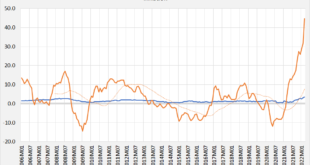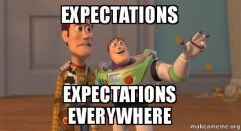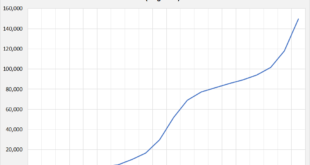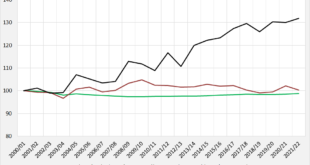Inflation is up. A remarkable aspect of todays inflation is the relatively high increase of energy prices (graph), an international phenomenon. Rising prices are a bitch when nominal incomes stay behind, which at the moment is the case in Europe. This leads especially to problems for people with lower incomes who have less money to spare and who spent a relatively larger amount of their income on energy. So, what to do? Should we raise interest rates? Hmmm…. The relation between...
Read More »The role of ideology in economicss
One of the purposes – if not the main one – of mimicking physics was to argue that economics is a value-free science as it is argued about the natural sciences. However, the truth is that every researcher starts her work expecting to arrive at some result. The critical issue is if, in the process of investigation, she is open to consider arriving at a different conclusion although it may contradict her own and her colleagues’ a priori beliefs. Any individual or social group has a...
Read More »Introducing maldevelopment indices
from Jorge Buzaglo and Leo Buzaglo Olofsgård and RWER current issue In recent years there has been a proliferation of alternatives to move beyond GDP as an indicator of socio-economic wellbeing. This was most probably due to the growing distrust of GDP as an appropriate metric for measuring the degree of advancement of societies. Another probable reason for the growing GDP disbelief is the ecological crisis rapidly approaching catastrophic levels, and the international opinion and mass...
Read More »Hurtless – Dean Lewis (Acoustic Cover by Jonah Baker)
Dean Lewis - "Hurtless" Acoustic Version by Jonah Baker ► Click here to SUBSCRIBE: https://www.youtube.com/c/jonahbaker?sub_confirmation=1 Follow Jonah Baker on: Instagram: http://www.instagram.com/jonahtothebaker Facebook: http://www.facebook.com/jonahtothebaker TikTok: https://www.tiktok.com/@jonahtothebaker Spotify: https://open.spotify.com/artist/6cpVjPOo5Ozn28hUfYBXqm?si=DjJznzRRRpmWT9MxYskFpQ&dl_branch=1 Filmed by Trace Vaughn (https://www.instagram.com/babytracey/)...
Read More »Recession fears: real and imagined
from Dean Baker There is a story of a football coach who ran running plays near the end of a game, when he clearly should have been passing. Apparently, he had seen data showing that teams that win, on average, run on a certain number of plays. His team was below this number, so he decided that he had to have more runs if his team was going to win. This is a classic case of confusing correlation with causation. (For those not familiar with football, when a team is ahead, it generally uses...
Read More »Expected utility theory — nothing but an ex-hypothesis
from Lars Syll In mainstream theory, preferences are standardly expressed in the form of a utility function. But although the expected utility theory has been known for a long time to be both theoretically and descriptively inadequate, mainstream economists gladly continue to use it, as though its deficiencies were unknown or unheard of. What most of them try to do in face of the obvious theoretical and behavioral inadequacies of the expected utility theory, is to marginally mend it. But...
Read More »Energy is getting cheaper (cost price). But: who profits?
Does the switch to Green Energy mean that energy will be cheaper? To answer this question we’ll have to answer several sub-questionsfirst: is there a switch to Green Energy? Is capacity used efficiently? And is Green Energy cheap? As I will argue below, looking at the sub questions the answer to the lead question is: yes. But this answer leads to a related question: above, we’re talking about cost prices, which are down. You might have noticed that consumer prices of energy are up. Who’s...
Read More »Wheat
Will the war in Europe affect availability of wheat, one of the staple foods of the world? One of the economic successes of the last two decades is an increase in the production of wheat which enabled stable average global consumption per capita (at around 68 kg. per year) and a slightly increased used as feed (close to 20% of total production). This was possible because of a surprisingly fast increase of yields per hectare (graph). Source: FAO-AMIS And, of course, because total...
Read More »Coldwell Banker Agents
Special offer to Lake Havasu Coldwell Banker agents.
Read More »Dean Baker Act Humbucker
Lazer Guitar Harley Benton GA15 Vox Satchurator Dean Baker Act Humbucker
Read More » Real-World Economics Review
Real-World Economics Review








